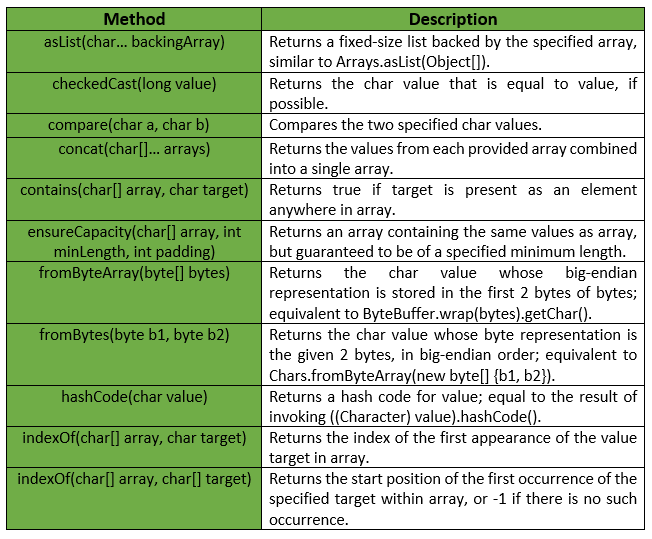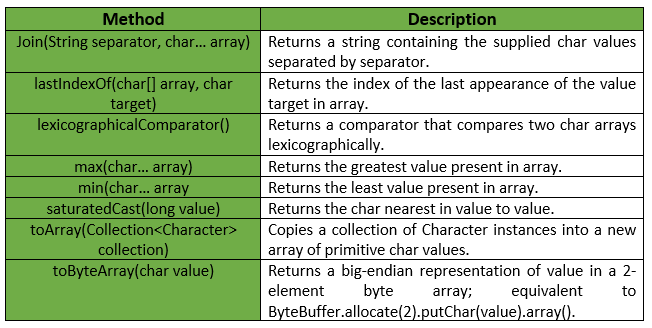Java Chars类
Chars 是原始类型char的一个实用类。它提供了与char基元有关的 静态实用方法 ,这些 方法 在Character或Arrays中都没有找到。这个类中的所有操作都是严格按照数字处理的,也就是说,它们既不认识Unicode,也不依赖本地。
声明:
@GwtCompatible(emulated=true)
public final class Chars
extends Object
下表显示了Guava Chars类的字段总结。

Guava Chars类提供的一些方法有:

异常
- checkedCast : 如果值大于Character.MAX_VALUE或小于Character.MIN_VALUE,则出现IllegalArgumentException。
- min : 如果数组为空,则出现IllegalArgumentException。
- max : 如果数组是空的,会出现IllegalArgumentException。
- fromByteArray : 如果字节数少于2个元素,则出现IllegalArgumentException。
- ensureCapacity : 如果minLength或padding为负数,则出现IllegalArgumentException。
- toArray : 如果集合或其任何元素为空,则出现NullPointerException。
下表显示了Guava Chars类提供的其他一些方法:

下面给出了一些例子,显示了Guava Chars类方法的实现:
例子1 :
// Java code to show implementation
// of Guava Chars.asList() method
import com.google.common.primitives.Chars;
import java.util.*;
class GFG {
// Driver method
public static void main(String[] args)
{
char arr[] = { 'g', 'e', 'e', 'k', 's' };
// Using Chars.asList() method which
// converts array of primitives
// to array of objects
List<Character> myList = Chars.asList(arr);
// Displaying the elements
System.out.println(myList);
}
}
输出:
[g, e, e, k, s]
例2 :
// Java code to show implementation
// of Guava Chars.toArray() method
import com.google.common.primitives.Chars;
import java.util.*;
class GFG {
// Driver method
public static void main(String[] args)
{
List<Character> myList = Arrays.asList('g', 'e', 'e', 'k', 's');
// Using Chars.toArray() method which
// converts a List of Chars to an
// array of char
char[] arr = Chars.toArray(myList);
// Displaying the elements
System.out.println(Arrays.toString(arr));
}
}
输出:
[g, e, e, k, s]
例3 :
// Java code to show implementation
// of Guava Chars.concat() method
import com.google.common.primitives.Chars;
import java.util.*;
class GFG {
// Driver method
public static void main(String[] args)
{
char[] arr1 = { 'g', 'e', 'e' };
char[] arr2 = { 'k', 's' };
// Using Chars.concat() method which
// combines arrays from specified
// arrays into a single array
char[] arr = Chars.concat(arr1, arr2);
// Displaying the elements
System.out.println(Arrays.toString(arr));
}
}
输出:
[g, e, e, k, s]
例4 :
// Java code to show implementation
// of Guava Chars.contains() method
import com.google.common.primitives.Chars;
class GFG {
// Driver method
public static void main(String[] args)
{
char[] arr = { 'g', 'e', 'e', 'k', 's' };
// Using Chars.contains() method which
// checks if element is present in array
// or not
System.out.println(Chars.contains(arr, 'g'));
System.out.println(Chars.contains(arr, 'm'));
}
}
产出 :
true
false
例5 :
// Java code to show implementation
// of Guava Chars.min() method
import com.google.common.primitives.Chars;
class GFG {
// Driver method
public static void main(String[] args)
{
char[] arr = { 'g', 'e', 'e', 'k', 's' };
// Using Chars.min() method
System.out.println(Chars.min(arr));
}
}
输出:
e
例6 :
// Java code to show implementation
// of Guava Chars.max() method
import com.google.common.primitives.Chars;
class GFG {
// Driver method
public static void main(String[] args)
{
char[] arr = { 'g', 'e', 'e', 'k', 's' };
// Using Chars.max() method
System.out.println(Chars.max(arr));
}
}
输出:
s
 极客教程
极客教程